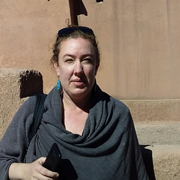Dr Erin Fitz-Henry
- Dr Erin Fitz-Henry

Dr Erin Fitz-Henry is Senior Lecturer in Social and Cultural Anthropology in the School of Social and Political Sciences.
Biography
Erin Fitz-Henry is a Senior Lecturer in Anthropology and the Development Studies in the School of Social and Political Sciences at the University of Melbourne. She joined the department in 2011 after receiving her PhD in Anthropology at Princeton University and her M.Div.
from Harvard Divinity School. She works primarily on transnational social movements, with a particular interest in the global movement for the rights of nature in Ecuador, the United States, and Australia. Her ethnographic work has focused on the use of these rights in contexts of large-scale resource extraction. This work is interdisciplinary, drawing on contemporary legal studies, sociology, critical development studies, and political science. Other interests include environmental justice and just transitions, post-colonialism, and new materialism.
What is the most memorable moment of your academic career?
It’s hard to pick just one, but in terms of my teaching career, I’d probably say when I first started tutoring as a PhD student at Princeton University. With a small group of undergraduates, I spent hours reading and debating the work of great public intellectuals from Erasmus to Said. It was in those classrooms as a young PhD student that I first experienced the exhilarations of undergraduate teaching! There have been many such experiences in the years since.
What shaped your academic interests?
I first pursued the study of comparative religion because I was interested in the diverse ways that people answer the most pressing existential and ethical questions of their lives. However, I soon found that my interests in cultural diversity were not limited to people’s religious systems, so I enrolled in a PhD in Socio-cultural Anthropology. At almost the same time, there was a groundswell of transnational organizing in opposition to the US-led wars in Iraq and Afghanistan – political developments that inspired me to ground (and to some degree redirect) my interests in social movements. For the past 15 years, I’ve conducted ethnographic research on transnational social movements in Ecuador, the US, and Australia that has built on and extended these earlier interests in comparative religion, allowing me to continue to explore how people seek to materialize their deepest sense of justice.
What book would you recommend a first-year student in your discipline area to read?
It depends on the student of course, but probably Patterns of Culture (Ruth Benedict), Black Skin, White Masks (Frantz Fanon), or anything by Edward Said, one of the most vociferous critics of the discipline.
What does academic advising mean for you?
Most fundamentally it means creating (or co-creating) a space outside the classroom in which to support students’ intellectual and emotional well-being in as holistic a manner as possible. My aim as an adviser is to listen as carefully as I can and then to ask provocative questions that hopefully open new pathways and possibilities. The great thing about advising is that I often learn just as much from students, so the benefits flow both directions!
What do you think it means for students? How will it assist them in their UG journey?
Advising offers students a flexible, informal space in which to test new ideas, to ask questions that they haven’t known where or how to ask before, and just generally to benefit from the experiences of academics who have spent many years navigating the university system and beyond. For some, it may be about setting very specific career objectives. For others, it may simply be a place to bounce around ideas or to get the perspective of an academic outside their primary discipline area. Advising should be thought of as a partnership that can be tailored to meet the evolving needs of students as they move through the three years of their undergraduate degrees.